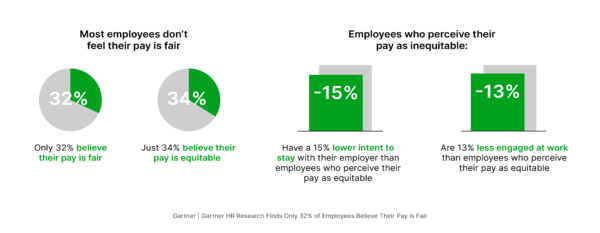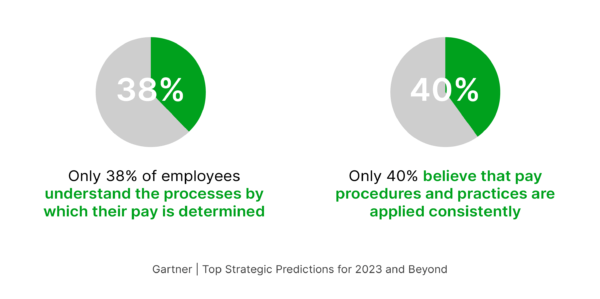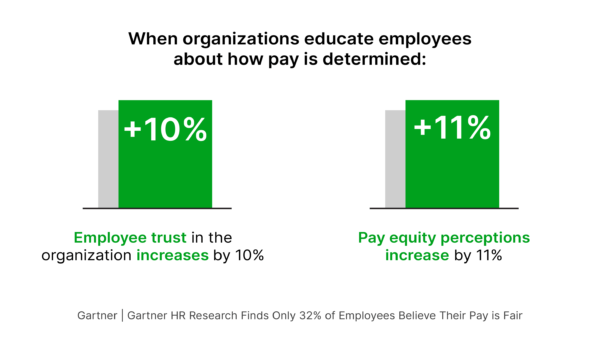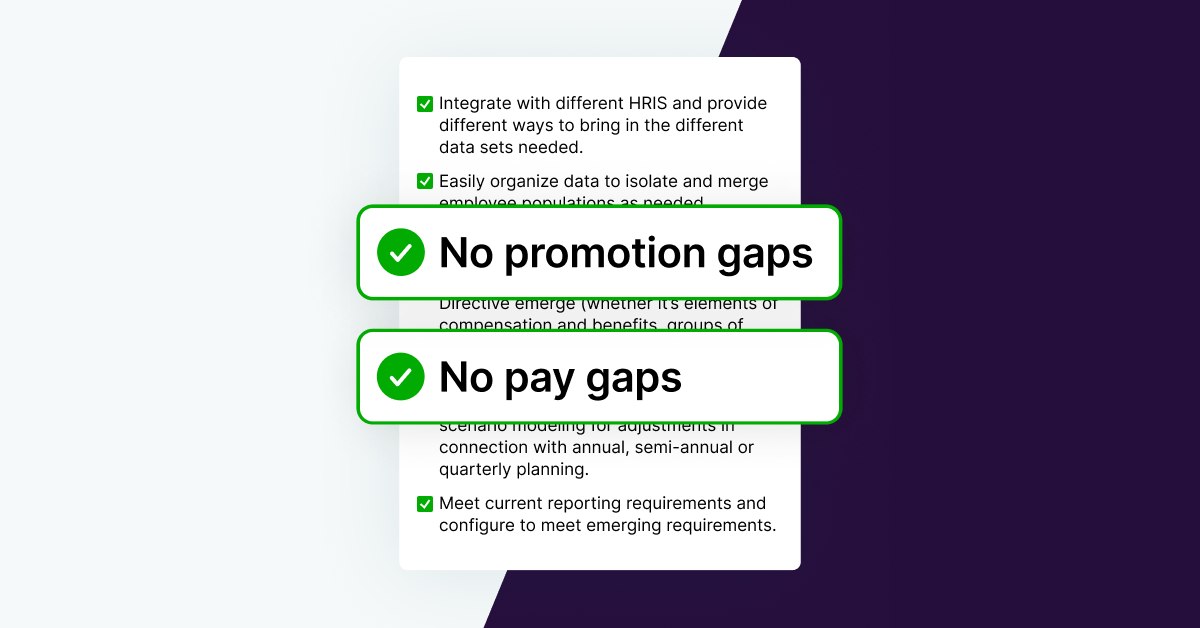Most companies recognize that taking action to improve pay equity is the right thing to do and are feeling pressure from investors, employees, and even new legislation to do more to close pay gaps and become more transparent about pay. But with the current uncertain state of the economy, prioritizing pay fairness is also becoming of increasing strategic importance due to the real-world impact that pay fairness can have on retaining talent.
Despite recent high-profile layoffs in the tech industry, the overall job market remains tight due to factors such as a rapidly aging workforce and perpetually low workforce participation rates. Additionally, companies are generally expected to “hoard labor” even in the face of a potential economic downturn, due to having experienced difficulty attracting and retaining top talent during the pandemic. This means that talent resilience and retention will matter more than ever next year.
One of the statistical planning assumptions in the report ‘Gartner’s Top Strategic Predictions for 2023 and Beyond — Seizing Uncertainty’ published November 11, 2022 is that “By 2025, organizations that remediate documented gender pay gaps will decrease women’s attrition by 30%, reducing pressure on talent shortages.”
There is a throughline from employees’ expectation for fairness, especially in compensation, to the level of trust that employees have in their employer and their willingness to stay. We rounded up recent research from Gartner in the Gartner Top 10 Strategic Predictions for 2023 and Beyond (published December 6, 2022), a Gartner article titled Gartner HR Research Finds Only 32% of Employees Believe Their Pay is Fair (November 28, 2022), and information shared during the Gartner ReimagineHR Conference 2022 (October 24-26, 2022).
Below we highlight some of the top findings, according to us, from recent Gartner research about the rising importance of pay equity to talent retention — and how “techequity” software can help companies make progress and keep employees.
1. Fair and equitable pay plays a crucial role in talent retention.
Employees right now are burned out, stressed out, and worried above all about money. In a volatile economy with high inflation cutting into their paychecks, the ability to pay bills and save for retirement are top of mind concerns.
Workers are currently incentivized to job hop as the most reliable way to get a large pay increase: At Gartner’s ReimagineHR Conference 2022, a session titled “Reimagining Pay in the New Normal” led by Katie Sutherland, Director of HR Advisory at Gartner, shared that employees who stayed at their companies “did 2% worse on pay increases than employees who choose to leave”. This means that, according to Gartner, “Compensation is the top driver in retaining talent” — and has therefore become one of the top concerns for HR teams.
“The top attrition driver is compensation. Employees want to be compensated fairly and will change jobs to get that pay.”
Gartner | Gartner’s Top Strategic Predictions for 2023 and Beyond – Seizing Uncertainty, November 11, 2022
In her presentation titled “Reimagining Pay in the New Normal” at the Gartner ReimagineHR Conference 2022, Katie Sutherland, Director HR Advisory, Gartner, also shared that top pay questions from HR teams right now include:
- How do I respond to inflation?
- How can I use pay to retain talent?
- How should I adjust pay if employees are no longer going into the office?
- How do I make sure pay is still fair?
That last question is increasingly important, because employees don’t just care about pay, they care about the fairness of their pay. According to a Gartner press release titled ‘Gartner HR research finds only 32% of employees believe their pay is fair’ dated November 28, 2022, “Less than one-third of employees feel they are paid fairly, while just 34% of employees believe their pay is equitable, according to a survey by Gartner, Inc.” The perception of pay equity has a demonstrable impact on employees’ intent to stay and engagement. “The Gartner survey of 3,523 employees in 2Q22 also found that that employees who perceive their pay as unequitable have a 15% lower intent to stay with their employer and are 13% less engaged at work than employees who perceive their pay as equitable.”
2. Employees need to understand the “how” behind their pay.
Most employees do not have an understanding of what determines their pay, nor do they believe that pay policies and practices are applied consistently. Gartner press release notes, “Only 38% of the employees we surveyed report that they understand how their pay is determined.”
How can companies improve employees’ sense of procedural fairness in compensation? We believe HR teams must first be certain their stated pay policies are working as intended and that they are truly paying employees fairly and consistently. This is where a pay equity analysis comes in, allowing companies to test whether the things they say they pay for — e.g. performance, experience, etc. — are impacting what they pay employees in practice. The next step is to clearly communicate the policies that impact compensation to employees.
3. Pay transparency and communication impact trust.
“Employee perceptions of pay equity aren’t rooted in compensation. Instead, the main driver of perception is organizational trust – when employees don’t trust their employers, they don’t believe their pay is fair or equitable.”
Tony Guadagni, Senior Principal in the Gartner HR practice | Gartner HR Research Finds Only 32% of Employees Believe Their Pay is Fair , November 28, 2022
Although many companies are taking action to close pay gaps and improve pay equity, many aren’t communicating about it clearly with their employees, leaving employees in the dark. By communicating openly about their pay equity efforts and educating employees on pay policies and processes, companies can help build employee trust in the organization and improve the perception of fairness.
A session at Gartner ReimagineHR Conference 2022 led by Emmet Fitzpatrick, Gartner analyst in Marketing & Comms discipline, discussed how executives can lead communications to improve organizational trust. A major factor of leader characteristics that impact trust in the company is decision-making visibility. “Message readability” also matters, so it’s important to provide context and definitions for concepts such as pay equity to ensure the communication can be easily understood. The end result of increased transparency is increased trust, which, according to the session, can positively impact “performance, collaboration, change management, advocacy, and PR/media coverage, among other areas.”
4. Leverage “techequity” software for efficiency gains and ongoing self-service pay equity expertise.
“HR leaders need to equip managers with tools that will enable them to make equitable pay decisions while remaining responsive to the other demands on the business.”
Tony Guadagni, Senior Principal in the Gartner HR practice | Gartner HR Research Finds Only 32% of Employees Believe Their Pay is Fair , November 28, 2022
In Gartner’s Top Strategic Predictions for 2023 and Beyond — Seizing Uncertainty report, Gartner describes that “A nascent “techequity” market is forming, with vendors creating software tools for pay equity assessments and some established HR systems providers claiming this functionality.”
Techequity software is faster, more secure, more efficient, and allows for a more ongoing, proactive approach to pay equity than backward-facing one-off analyses performed in-house or with law and consulting firms. By leveraging purpose-built techequity software, companies can more effectively embed fairness into all pay decisions and policies to prevent pay issues, rather than repeatedly and retroactively fixing inequities that continue to arise and grow.
Gartner’s report also recommends that companies “Require a statistically valid process that accounts for the predictors of pay….” The legal complexities of pay equity require specialization and expertise. The optimal techequity software is transparent, has best-in-class math and methods baked in, providing consistent, accurate and in-depth analyses that are simple to understand, easy to act on, and which are legally defensible.
5. Make pay equity a cross-functional priority.
“An ideal pay equity team consists of leaders and employees across levels, business units and functions with insight into the practices and processes that create pay equity gaps and a visible commitment to pay equity within the organization.”
Tony Guadagni, Senior Principal in the Gartner HR practice | Gartner HR Research Finds Only 32% of Employees Believe Their Pay is Fair , November 28, 2022
Pay equity progress can’t happen in a silo. As Gartner’s Top Strategic Predictions for 2023 and Beyond — Seizing Uncertainty report states, “Pay equity is not an HR problem; it’s an organization problem.” Compensation decisions happen at every level of a company and touch a lot of roles and responsibilities, including HIR, Total Rewards, DE&I, talent acquisition, the employee experience, legal, leadership, and communications. Organizations need a cross-functional strategy to achieve stakeholder buy-in and consensus, align overlapping priorities, centralize efforts and partnerships, and coordinate communications both internally and externally.
“According to Gartner’s July 2022 survey, 72% of total rewards leaders report that their organization’s senior leadership believes that pay equity is a high or very high priority.” However, leadership buy-in alone isn’t enough to ensure progress, as decision-makers often deprioritize pay equity in day-to-day practice.
We believe that ongoing measurement and easy-to-access data analytics are crucial to creating an actionable strategy and driving accountability to ensure follow-through at all levels of the organization on stated pay equity goals.
Build trust through data-driven pay equity action and transparency
All of these themes — trust, fairness, pay equity, and transparency — are an interconnected house of cards. In today’s macroenvironment, employees are stressed, especially about money — which makes pay top of mind when evaluating their job satisfaction. They also want to feel cared for by their employers, and that they can trust them. The perception of the fairness of pay is crucial to building trust with employees, which requires transparency about pay policies, practices, and analyses. Pay equity success requires cross-functional coordination and communication between teams and leaders in the company to ensure the right message is being conveyed, underpinned by data-driven action and accountability.
By tackling pay equity using purpose-built techequity software, companies can create data-driven action plans and build a more proactive, ongoing approach to pay equity that helps stop new inequities from cropping up. Syndio’s leading PayEQ ™ solution puts more control in the hands of compensation teams with easy-to-use technology and proven methodologies built by industry experts to help companies go from fixing pay issues to monitoring and preventing them. Want to learn more about our leading techequity solution?
GARTNER is the registered trademark and service mark of Gartner Inc., and/or its affiliates in the U.S. and/or internationally and has been used herein with permission. All rights reserved. Gartner does not endorse any vendor, product or service depicted in its research publications, and does not advise technology users to select only those vendors with the highest ratings or other designation. Gartner research publications consist of the opinions of Gartner’s research organization and should not be construed as statements of fact. Gartner disclaims all warranties, expressed or implied, with respect to this research, including any warranties of merchantability or fitness for a particular purpose.





